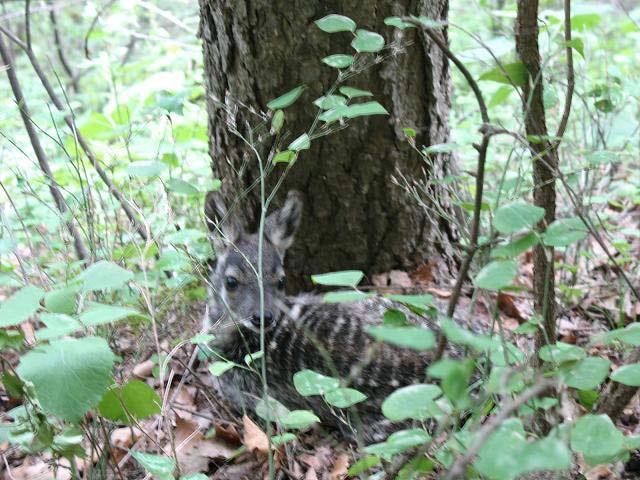Xiuxiang Meng
Other projects
17 Jul 2005
Studies on the Conservation of the Musk Deer and Habitat in Dafengding National Nature Reserve of China.
18 Dec 2007
Resolving the Conflict Between Minority Communities and Wild Boars in Dafengding National Nature Reserve (DNNR) South West China
To explore the wild endangered Alpine musk deer population in XNNR, determine its seasonal patterns of habitat utilization and the key influencing factors, and assess the impacts from the thriving eco-tourism.

Newborn musk deer. © Mr Pan Shixiu
Musk deer (Moschus spp., including 5 or 6 species) is small solitary forest ruminant, and the male adult could secret valuable musk which is the aim of illegal poaching. Now, the musk deer has been endangered because of the habitat loss and other reasons. Alpine musk deer (Moschus sifanicus / chrysogaster), one of five musk deer species (Moschus spp.), is endemic to western China.
The project area, namely XNNR, once abounded in Alpine musk deer which was estimated to be 5000~6000, but now it is difficult to find even the faeces in its nature habitats, for which, however, the real reason has not been explored.
XNNR locates in the Yellow Plateau of China and surrounded by barren landscapes, which has been named the “Green Island in Desert” and famous for the primitive forests, and the eco-tourism has been flourished. For a long time, the potential ecological impacts from the tourism on the deer and reserve have not been evaluated. Moreover, there are several communities distributed in the XNNR, but the impacts and intension of the influence resulted from the local living have not been surveyed.
The main aim of the proposed project is to explore the wild endangered Alpine musk deer population in XNNR, determine its seasonal patterns of habitat utilization and the key influencing factors, moreover, assess the impacts from the thriving eco-tourism through extensive field and socio-economic surveying. Furthermore, the project will be aimed to improve the environment consciousness and convey the concept of nature conservation through many actions such as public presentation, environment education, gathering talking and the interaction with eco-tourists. On the basis of data and information collected from all sources, the reasonable managing strategies will be worked out to improve the conservation situation of Alpine musk deer and reduce the potentially detrimental influences from the eco-tourism and the communities, and then the integrated nature protection could be reached.